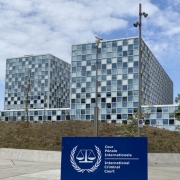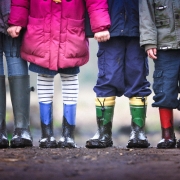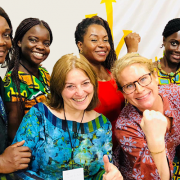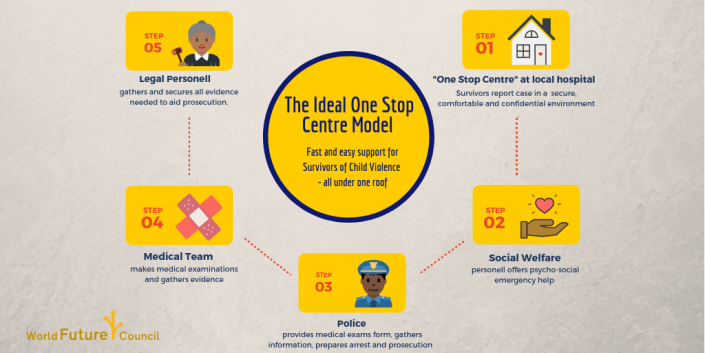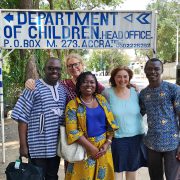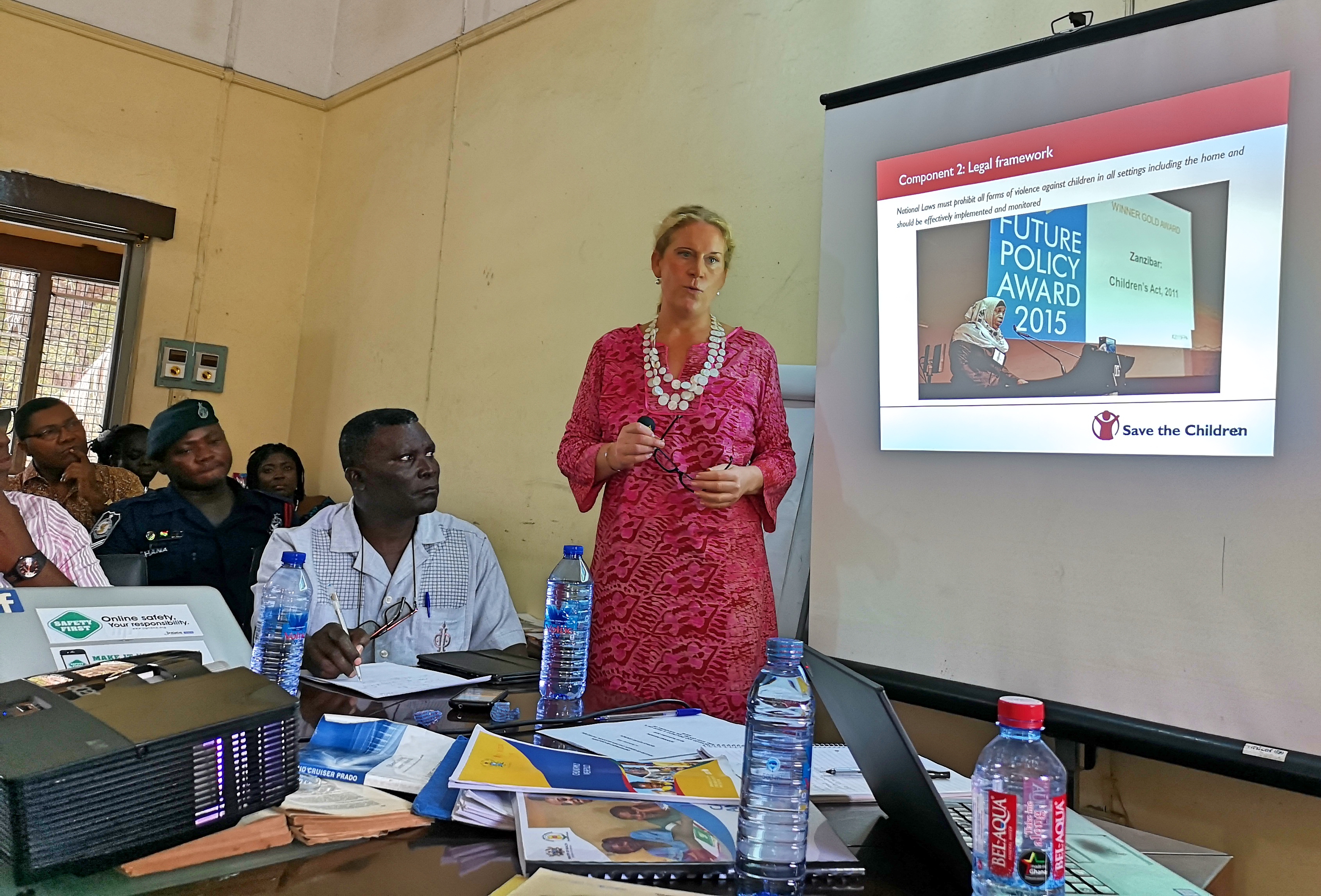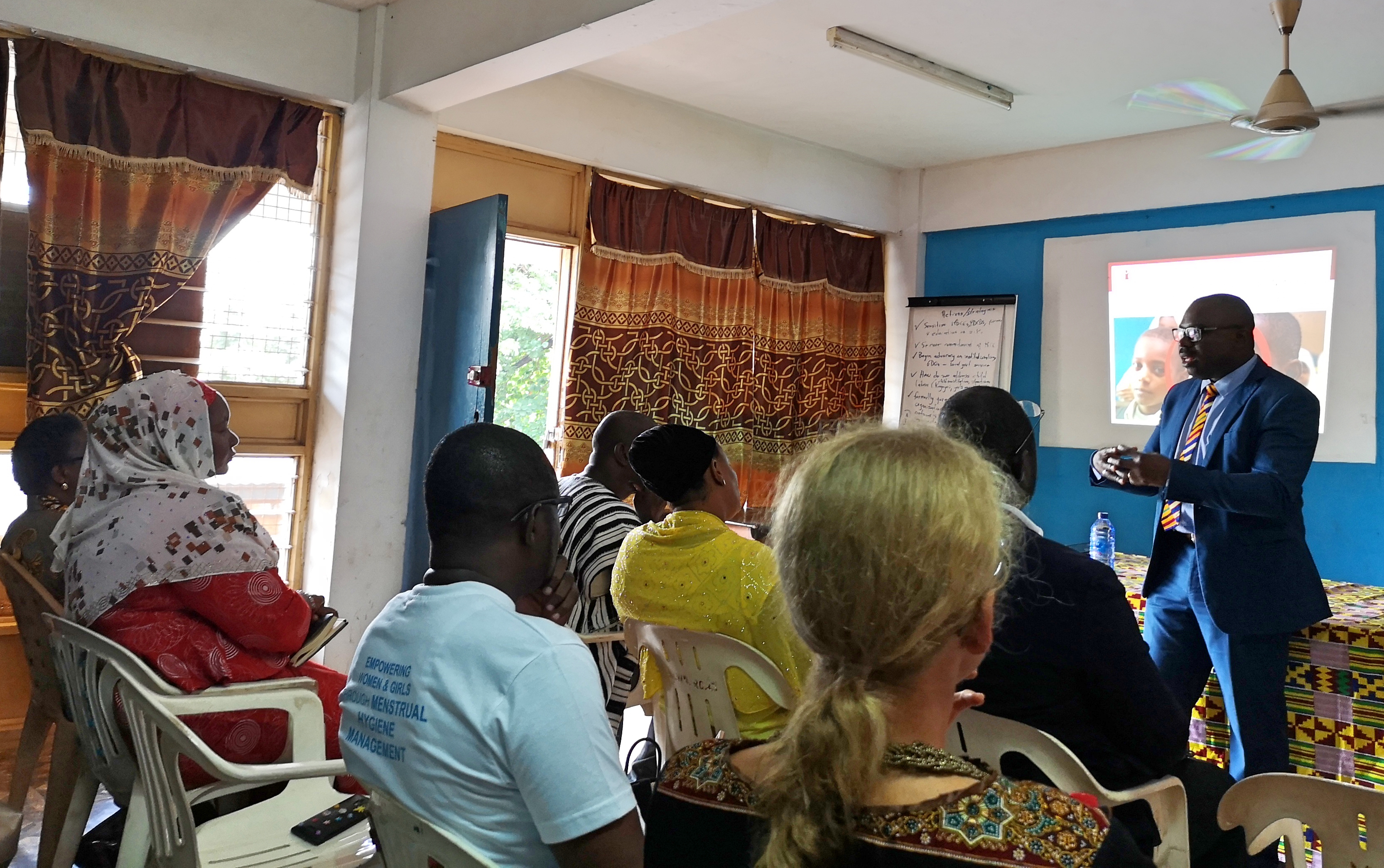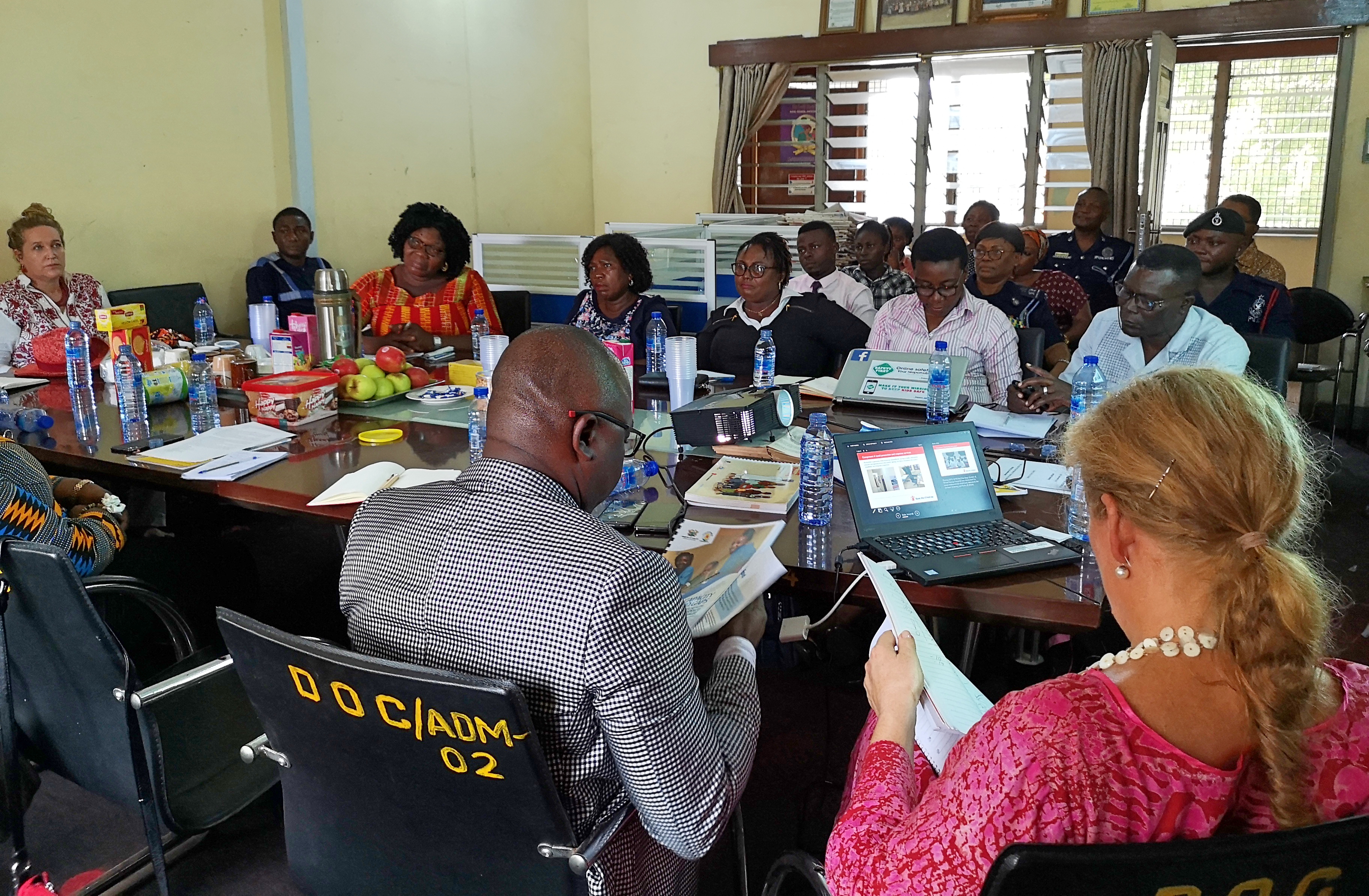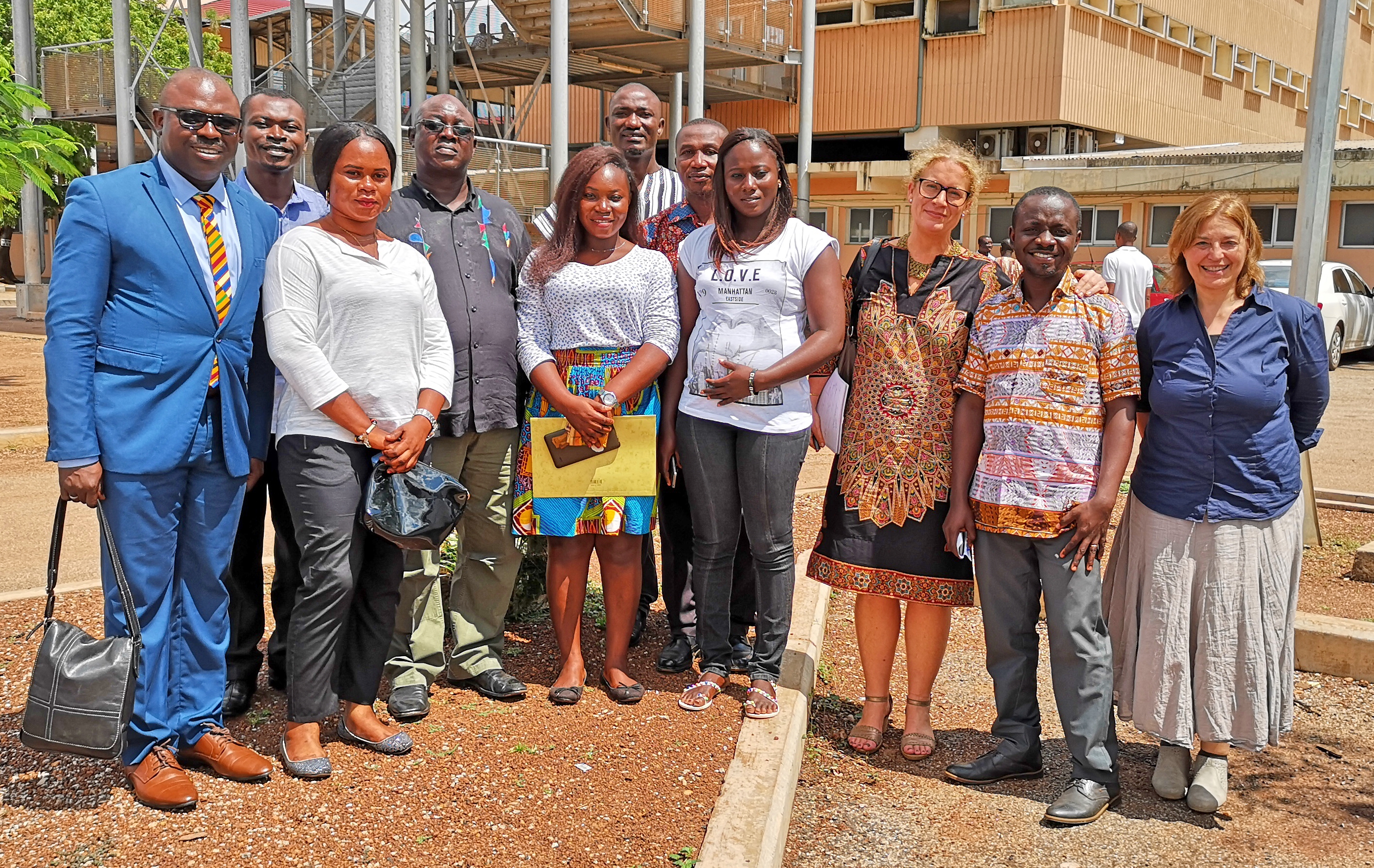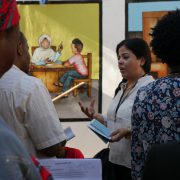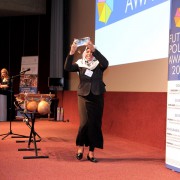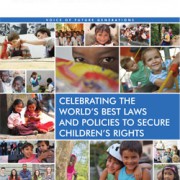Advancing the child protection system in Ghana: One-Stop-Centers for survivors of child violence
International Criminal Court continues series of judgments condemning crimes against child soldiers
With its judgment on 4 February 2021 against Dominic Ongwen, the International Criminal Court (ICC), based in The Hague, Netherlands, adds its third trial judgment to a series of findings that condemn crimes against children.
COVID-19 — From health crisis to child rights crisis
Why health, wellbeing, and education of children across the globe are at risk from the pandemic — especially, but not only, in the Global South
Ghana on its way to its enhanced child protection system
Ghana on its way to its enhanced child protection system for survivors of child violence
For majority of children in Ghana, violence is an unfortunate part of their everyday life. According to official statistical reports, 9 out of 10 children are exposed to mental or physical violence, and physical punishment is a common phenomenon. More shocking are the figures for sexual violence: one out of five girls is sexually abused. There is an urgent need for action to protect children from violence! For girls and boys who experience and survive violence or abuse, a central, child-friendly centre providing the most essential services under one roof would be established from the first quarter of 2019, where trained personnel from the Social Welfare, Domestic Violence Unit of the Police Service (DOVVSU) and Ghana Health Service are available to offer prompt, secured and confidential service to victims. Our team conducted a technical workshop with representatives of Ministries and other key stakeholders responsible for child protection in Ho, South-East Ghana together with experts from Zanzibar to discuss and develop a roadmap to establish a pilot in Accra. These are the main results at a glance.
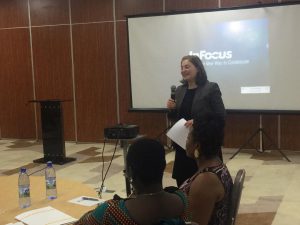
Samia Kassid – opening remarks
In November 2017, the World Future Council Foundation invited political decision-makers from 12 African and Asian countries to Zanzibar to acquaint themselves with the country’s comprehensive Children’s Act and its implementation. Zanzibar won the Gold Award of the “Political Oscar” Future Policy Award in 2015.
The Ghanaian delegation, consisting of representatives from the Department of Children of the Ministry of Gender, Children and Social Welfare and the Law Faculty of the Ghana Institute of Management and Public Administration were inspired by the one-stop-center model that Zanzibar has currently implemented in 6 out of 11 districts.
What is a one stop center?
One-Stop-Center (OSC) are central contact points for children and their families affected by (sexualised) violence. Here survivors can find psycho-social support, a police office to initiate criminal investigation as well as medical treatment including collection of forensic evidence under one roof. Ideally, legal help is part of the centre. The graphic illustrates the model:
As an important element of a strong national child protection system, the one-stop-centres provide survivors (girls and boys, women and men) with various initial services under one roof. As a result, the affected person does not have to go through the trauma of narrating the incident several times and also receives quick help. It helps parents stay focused on treating their child and persecuting the perpetrator. In cases without the OSC, survivors mostly have to visit different institutions – that costs money and time and often parents lose the momentum to persue the case. The later a case is reported, the harder it is to gather evidence of abuse on a child’s body.
Ideally, a one-stop center provides four services and is usually docted at a hospital:
- Psycho-social support – this is where the first interview takes place and the social worker decides which further steps are required. If there is an abuse / violence, the child will be escorted to the next room, where a police officer in civilian clothes and trained in child-friendly behaviour will fill in the form to follow up the case.
- Medical examination: in a third room, a medical doctor takes care of the child. Here the first medical and forensic examinations take place. If the child needs further special treatment, it will be treated immediately in the hospital.
- The employees of the one-stop-center are provided by the relevant ministries (Health, Interior, Family Affairs) and the Centre is (at best) coordinated by the Ministry of Health. All employees receive same training so they can better collaborate and follow same procedures and guidelines in writing the reports. This makes it easier for the police and the courts to track and prosecute cases.
- Support for counseling and legal aid is ideally offered in the fourth room.
Ghana on the way to pilot a one stop centre
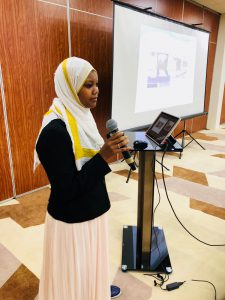
A member of the Zanzibar team sharing her experience at the workshop
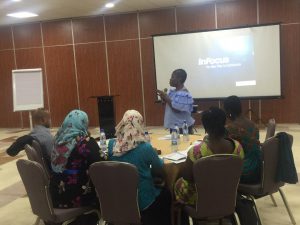
The Director of the Department of Children, speaking at Workshop
After intensive discussions with the Department of Children from April 2018, the World Future Council Foundation organised a technical workshop to fully introduce the state agencies in the establishment and management of a one-stop-center model in Ghana from the 25-27 November 2018. We invited experts from Zanzibar to Ghana: Deputy Chairwoman Halima Abdallah, who spearheaded the establishment of the One-Stop-Center in the Ministry of Family and Health, Dr. Marijani, who has been responsible for medical and forensic investigations since its implementation in 2011, and Farshuu Khalfa, head of a one-stop center in Stone Town. Their insights, expertise and practical experience were most welcome and helpful in drawing up the roadmap for Ghana.
Under the auspices of the Children’s Department, 30 key representatives and decision-makers took part in the workshop to discuss the need for the OSC and to develop the roadmap for a pilot program. The participants represented the Ministry of Health, Ministry of Interior, Ministry of Gender, Children and Social Protection, the Social Welfare Department and the specialised Domestic Violence Unit of the Police service – DOVVSU. Medical representative and international child rights organisations including ActionAid, World Vision, International Needs, UNFPA and UNICEF were also present.
The most important results of the workshop at a glance:
- Development of a roadmap for the establishment of a pilot in Accra
- National coordination agency of the One-Stop-Center pilot program will be the Ministry of Health with support of other ministries
- An inter-ministerial conference is scheduled for the first quarter of 2019 to decide on the roadmap and timetable
- A core group will identify a possible location for the pilot program in Accra
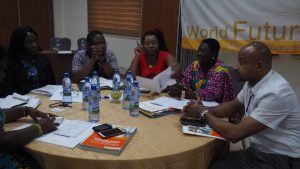
Working groups during the workshops.
Strengthening the child protection system in Ghana
Last week, the World Future Council was on a scoping mission to Ghana to introduce the model of one-stop-centers to stakeholders in Ghana. The aim is to build on the existing structures to strengthen the child protection system in Ghana. Together with the Department of Children we had good discussions with the National Child Protection Committee in Accra and the Northern Regional Child Protection Committee in Tamale. We met dedicated and engaged partners and look forward to work with them on a pilot in November this year. The one-stop-centers provide essential services for survivors of abuse under one roof. During our international conference on child protection we hosted in Zanzibar last year, we introduced the model of one-stop-centers, which inspired Ghanaian policy makers attending the conference. The Zanzibar’s Children’s Act 2011, which won our Gold Future Policy Award in 2015, layed the foundation for the child protection system in Zanzibar.Strengthening the child protection system in Ghana
one-stop-centers
Policymakers gather to share child rights best practice on protection and participation in Zanzibar
From the 28 – 30 November the World Future Council (WFC) hosted an international child rights conference in Zanzibar to explore the positive impacts of Zanzibar’s Children’s Act and share success stories on child protection, child friendly justice and participation from around the world. Representatives of ministries and policymakers from 12 countries, mainly from Africa and Asia, alongside experts on children’s rights and representatives from civil society drew up the Zanzibar Declaration on Securing Children’s Rights, committing themselves to taking strong action to eradicate all forms of violence against girls and boys. The assembly greatly benefited from the expertise and passion of two WFC Councillors Dr. Gertrude Ibengwé Mongella, former President of the Pan-African Parliament and Dr. Auma Obama, Chair and Founder of the Sauti Kuu Foundation.
Zanzibar Declaration on Securing Children’s Rights
At the International Child Rights Conference in Zanzibar on sharing best practice and policy on child protection, justice and participation, convened by the World Future Council with the support of Ministry of Labour Empowerment Elders Youth Women and Children of the Revolutionary Government of Zanzibar;
We, representatives, nominated by our ministries, and policymakers from Ghana, Indonesia, Liberia, Nigeria, Seychelles, Somaliland, South Africa, South Sudan, Sudan, Tanzania, Tunisia, Zanzibar and experts on children’s rights and representatives from civil society;
Acknowledging the commitment of the Sustainable Development Goals (SDGs) to end all forms of violence against girls and boys by 2030 (especially SDG 5 and 16), and to promote participation of children;
Recognising successful and exemplary policies and programmes in Africa and Asia; for example, Zanzibar’s Children’s Act 2011 that was highlighted by the Future Policy Award 2015 initiated by the World Future Council in cooperation with UNICEF and the Inter-Parliamentary-Union;
Further recognising that countries have ratified the UN-Convention on the Rights of Child and the African Charter on the Rights and Welfare of the Child;
Emphasising the urgent need to harmonise laws and policies in accordance with internationally and regionally agreed instruments, that there is an urgent need to act on a community, local and national level to introduce and scale up successful experiences and best practices to end all forms of violence against girls and boys;
Commit to:
Take back to our countries, policies and programme ideas, and successful experiences discussed at the International Child Rights Conference in Zanzibar.
Build support for these in our national and local governments and with our parliamentarians, local leaders, families, civil society organisations, and media.
Protect and parent children positively; putting children’s best interests at the centre of decisions that affect them.
Address gender inequality by taking a holistic and lifelong approach to the elimination of violence against women and children.
Take action to eradicate all forms of violence against children, through raising awareness and sensitization about violence against girls and boys, harmful practices (e.g. child marriage) and corporal punishment in all settings.
Strengthen formal and informal child protection systems on all levels with a strong focus on prevention programmes (including family preservation, the involvement of fathers and male caregivers), and to advocate for quality training of social workers, the implementation of disaggregated data management systems (CPMIS), effective case management as well as reporting and evaluation mechanisms.
Lobby and advocate governments to increase their budgets for children, and develop innovative mechanisms for financing child protection services.
Facilitate effective implementation of local and national programs, policies and National Plans of Action, on child protection and participation, as part of national strategies to effectively tackle child abuse, neglect and exploitation.
Promote the harmonization of national, religious and customary laws so that they advance the ACRWC and the UNCRC and protect the best interests of the child.
Zanzibar, 30 November 2017
Signatories
Andi Taletting Langi, Deputy Director for Human Rights Foreign Affairs Cooperation Directorate General of Human Rights Ministry of Law and Human Rights of the Republic of Indonesia, Indonesia
Edmund Amarkwe Foley, Head of Department for Public Law, GIMPA Faculty of Law, Ghana
Christopher Lartey, Senior Programme Officer, National Advisory Committee on Child Protection Policies and Law Reform, Ghana
Dr Nkatha Murungi, Head Children and Law Programme, African Child Policy Forum
Victoria Williams Zaway, Director of Children Protection and Development Division, Ministry of Gender, Children and Social Protection, Liberia
Mariam Fitumi Shaibu, Chief Social Welfare Officer, Federal Ministry of Women Affairs and Social Development, Child Development Department, Nigeria
Sylvette Sandra Jeannine Gertrude, Director Social Services, Ministry of Family Affairs, Social Affairs Department, Social Services Division, Seychelles
Chantal Cadeau, Principal Social Work, Ministry for Social Affairs, Seychelles
Khadra Ali Abdi, Head of Child Protection Unit of the Ministry of Labour and Social Affairs, Somaliland
Abdulaziiz Saed Salah, Executive Director, Youth Volunteers for Development and Environment Conservation (YOVENCO), Somaliland
Shabhan Abdillahi Elmi, YOVENCO, Somaliland
Mohamed Aden Nur, CP/ CRG Officer, Save the Children, Somaliland
Kinsi Farah Aden, Project Manager, Save the Children, Somaliland
Suzan Akwii CP/CRG Technical Specialist, Save the Children, Somaliland
Mohamoud M. Aqli, CP/CRG Programme Manager, Save the Children, Somaliland
Abdikarim M. Yussef, CP Officer, Save the Children, Somaliland
Bongani Sithole, Department of Social Development, South Africa
Sonia Vohito, Africa Project Coordinator, The Global Initiative to End All Corporal Punishment of Children, South Africa
Celina Grace Peter Kenyi, Director for Child Welfare, Ministry of Gender, Child and Social Welfare, South Sudan
Salma Radwan Salmeen Saeed, Head of the Child, Women and Persons with disabilities Section, Ministry of Justice, Sudan
Yassir Shalabi Mohamed, Executive Director, Child Rights Institute, Sudan
Dr Katanta Lazarus Simwanza, Head of Gender, ASRHR and Inclusion, Plan International, Tanzania
Asma Matoussi Hidri, Early Childhood Director, Ministry of Family Women and Childhood, Tunisia
Fatma Bilal, Principal Secretary, Ministry of Labour, Empowerment, Elders, Youth, Women and Children, Zanzibar
Khadija Bakari Juma, Principal Secretary, Ministry of Education and Vocational Training, Zanzibar
Nasima Chum, Director Dept. of Women and Children Development, Ministry of Labour, Empowerment, Elders, Youth, Women and Children, Zanzibar
Mhaza Gharib, Director Dept. of Social Welfare, Ministry of Labour, Empowerment, Elders, Youth, Women and Children, Zanzibar
I M. Ibrahim, Director of Public Prosecutions, Zanzibar
Didas Khalfan, Ministry of Labour, Empowerment, Elders, Youth, Women and Children, Zanzibar
Hon. Sabra Mohamed, Chairperson at Children’s Court, Zanzibar
Hon. Valentina Andrew Katema, Regional Magistrate, Zanzibar
Dr Issa Ziddy, State University of Zanzibar
Sheikh Daud Khamis Salim, Appellate Khadi’s Court, Pemba, Zanzibar
Abdallah Ahmed Suleman, Executive Secretary, Tanzania Youth Icon [TAYI], Zanzibar.
Mali Nilsson, Zanzibar Representative, Save the Children
Shane Keenan, Child Protection Specialist, Zanzibar Field Office ,UNICEF
Nasria Saleh Hamid, Zanzibar Social Work Association, Zanzibar Child Rights Centre
Mussa Kombo Mussa, Chairman of the Zanzibar Children’s Rights Network
Nuru Mwalim Khamis, Vice Chairperson of the Zanzibar Social Worker Association (ZASWA), Zanzibar Child Rights Centre
Kauthar Kassim S. Dadi, Zanzibar Social Work Association, Zanzibar Child Rights Centre
Nunuu Ali, Zanzibar Child Rights Forum/Society for the Protection of Women and Children Rights and Development Pemba
Hasina Salim Bukheti, Zanzibar Child Right Forum (ZCRF), Vice Chairperson/ member of executive committee of Zanzibar Association for Children Advancement (ZACA).
Seif Zanzibar, Child Rights Centre
Dr Auma Obama, Founder and Chair Sauti Kuu Foundation, Chair of the Expert Commission on the Rights of Children, World Future Council
Hon. Dr Amb. Gertrude Ibengwé Mongella – Former President of the Pan-African Parliament, Honorary Councillor World Future Council
Alexandra Wandel, Director, World Future Council
Samia Kassid, Senior Project Manager – Rights of Children, World Future Council
Alistair Whitby, Senior Policy Officer – The Rights of Children, Future Justice, World Future Council
Dr Kate McAlpine, Doing the Right Thing.
Tia Egglestone, Consultant, World Future Council
Heather O’Dea, Consultant, World Future Council
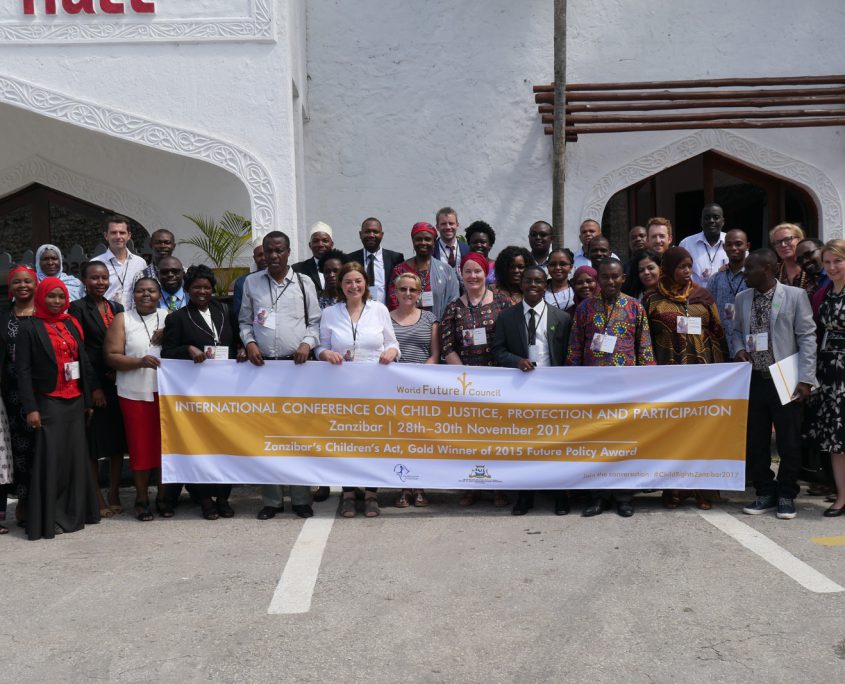
Participants from across Africa and Asia joined the International Conference on Child Justice, Protection and Participation
Media Contact
World Future Council
Miriam Petersen
Media & Communications Manager
miriam.petersen@worldfuturecouncil.org
Phone: +49 40 30 70 914-19
Promoting, Protecting and Realising the Rights of Children: A Matter of Political Will
Promoting, Protecting and Realising the Rights of Children: A Matter of Political Will
Every child has the same human rights as adults. These include the right to life, food, health, education, development, a clean environment and the right to be heard. However, despite recent advances, many children today still suffer from poverty, gender inequality, homelessness, abuse, preventable diseases, and unequal access to education. Their rights are forgotten or ignored. Approximately 300 million children go to bed hungry every night. Environmental degradation and conflicts are forcing children to flee their familiar surroundings and live as refugees. Others are forced into exploitative work and cannot exercise their right to education, robbing them of the chance to create a better future.
Good laws and policies – and their effective implementation – are the foundation for protecting the rights of girls and boys that were enshrined in the UN Convention on the Rights of Children in 1989. However, children’s rights are not brought to life through pronouncements; they require resolve from our leaders and most importantly practical implementation on the ground.
It is now up to national governments to show the political will to ramp up actions at home and lead the response against the violation of children’s rights by ensuring such international commitments are adhered to through laws. Civil society must also play its part to ensure that ignorance and inaction are no longer an option! Instead of asking why things need to change, we have to finally start focusing on the how and highlight solutions that work!
The good news is solutions exist
This year, the World Future Council is celebrating the best laws and policies to secure children’s rights, with its ‘Future Policy Award’, to raise global awareness of those solutions that successfully overcome the barriers preventing children from enjoying their rights to a clean and healthy environment, to education, to protection (from child labour, child trafficking, child marriage) and to participation. Only by highlighting these solutions can we speed up policy action towards just, sustainable and peaceful societies for future generations.
From America, to Europe, Africa, Asia and Oceania, we have already seen significant changes in policies and attitudes towards children and their rights that provide hope for the future. We are in a unique position to learn from pioneers who have shown us how it can be done. Now it is up to us to replicate and build on their success stories. Fortunately, we do not have to start from scratch.
In Zanzibar, the “Children’s Act” which won this year’s Future Policy ‘Gold Award’has proven to be an effective response to child abuse and violence, while promoting and protecting child rights at the same time. The law has led to a marked societal change in attitudes towards children in the country. Alongside a revamped child protection system, many schools are now piloting alternatives to the previously widespread use of corporal punishment and thousands of children have been assisted in returning to school from harmful work. A pioneering feature of the law was a village-level child consultation process which provided young people with an understanding of the law and their rights, giving them the opportunity to voice their priorities and feed into the law’s drafting process. Their views are now represented by over 200 active Children’s Councils.
You are currently viewing a placeholder content from Default. To access the actual content, click the button below. Please note that doing so will share data with third-party providers.
More InformationThe state of Maryland in the US was the first to require students to be environmentally literate as a high school graduation requirement. The results point to positive school-wide impacts in knowledge, behaviour and local action projects as well as broad improvements in student’s learning outcomes across a range of subjects. Other states, such as Kentucky and Utah have since developed education plans based on Maryland’s “Environmental Literacy Standards”.
Finland’s ‘Basic Education Act’, adopted in 1998, guarantees children’s equal access to high-quality education and training, irrespective of ethnic origin, age, wealth, language or location. Finland’s holistic and trust based education system produces excellent results, both in terms of child well-being and international test scores.
You are currently viewing a placeholder content from Default. To access the actual content, click the button below. Please note that doing so will share data with third-party providers.
More InformationIn Sweden, the Children and Parent Code prohibits all corporal punishment and other humiliating treatment of children. It has fostered a profound change of attitude across Swedish society in relation to violence against children, gaining a very high level of awareness and support, including from children. Sweden is also working with other states to promote universal prohibition of all violent punishment of children.
Finally, Argentina’s Supreme Court’s Judgement which upheld the country’s constitutional right ‘to an environment which is healthy, balanced and suitable for human development’ led to a comprehensive inspection, restoration and clean-up plan for the heavily polluted Matanza-Riachuelo river basin in Buenos Aires. These efforts have provided clean drinking water and sanitation to over a million people and are directly benefitting local children through access to health care and relocated housing. It demonstrates what can be achieved when judges start recognizing and enforcing environmental rights which are included (but not enforced) in three quarters of the world’s national constitutions.
You are currently viewing a placeholder content from Default. To access the actual content, click the button below. Please note that doing so will share data with third-party providers.
More InformationInaction no longer an option
By looking at these examples, we can lay out the policy incentives required to build a world of growing solutions, rather than growing problems. It is essential that we highlight these best policies, engage our communities to spread the word about them and empower policy-makers to implement them. Action requires more than intent and good will: The time has come for world leaders to step up to the challenge and leverage their powers on behalf of the youngest members of our societies.
Giving these policies the recognition they deserve by awarding them with the Future Policy Award is only the beginning. We need to raise more global awareness of these pioneering examples and assist policy-makers to develop and implement similar initiatives. The time to act is now!
Originally published on

Pioneering child rights policy from Zanzibar wins distinguished award
Hamburg/Geneva/New York – 20 October 2015: Zanzibar’s pioneering child rights law is the winner of the 2015 Future Policy Award on securing children’s rights, beating 29 other nominated policies to the prize. The Award will be presented at a ceremony in Geneva today by the World Future Council, the Inter-Parliamentary Union (IPU) and UNICEF during the 133rd IPU Assembly.
FPA 2015: Celebrating the world’s best laws and policies to secure children’s rights
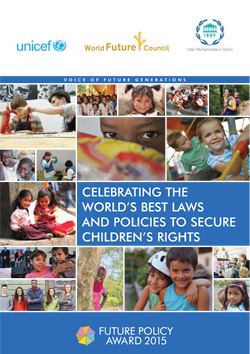
Abstract
In 2015, the World Future Council’s Future Policy Award seeks to highlight innovative laws and policies that contribute to promoting, realising and securing children’s rights to provision, protection and participation as stated in the UN-CRC and its Optional Protocols. We encouraged the nomination of laws and policies that are successfully overcoming the barriers that prevent children from enjoying their rights to education, participation, and to protection – with a special focus on child labour, child trafficking and child marriage. We also looked into measures that acknowledge the interdependence of environmental rights and children’s rights, and the need to strengthen and spread legislative advances in environmental protection.
You need to load content from reCAPTCHA to submit the form. Please note that doing so will share data with third-party providers.
More InformationYou are currently viewing a placeholder content from amChart. To access the actual content, click the button below. Please note that doing so will share data with third-party providers.
More Information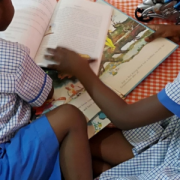

 MEDIA CONTACT Anna-Lara Stehn Media & Communications Manager
MEDIA CONTACT Anna-Lara Stehn Media & Communications Manager 